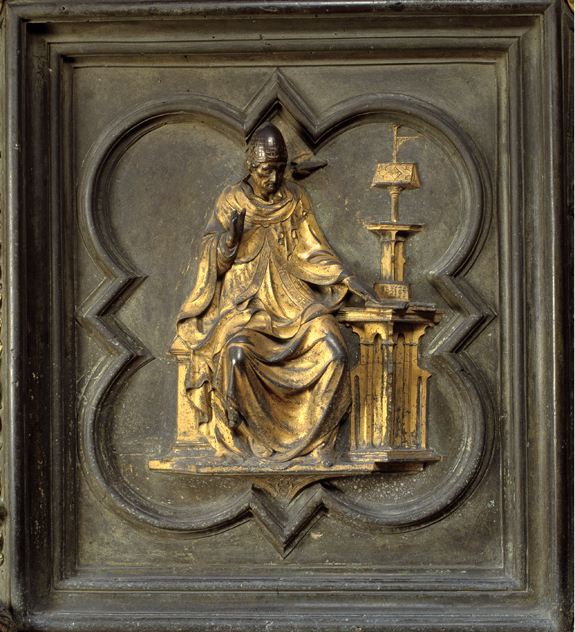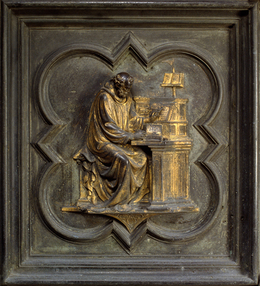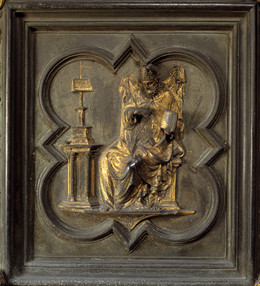Panel XXVII - Gregory the Great
Panel details:
"for, when we administer necessaries of any kind to the indigent, we do not bestow our own, but render them what is theirs; we rather pay a debt of justice than accomplish works of mercy....” St Gregory the Great
Pope Gregory I, surnamed the Great, was born in Rome circa 540. He was the 64th bishop of Rome and was pope of the Catholic Church from 3 September 590 until his death in Rome in 604. His father, Gordianus was of a noble patrician family who were probably descendants of the illustrious gens Octavia. Gregory’s father had two sisters, Tarsilla and Emiliana, who are also venerated as saints, while his mother, Sylvia (also elected to sainthood in 1603) came from a more modest family. Gregory studied the liberal arts, rhetoric and philosophy, as was the custom for youths of his social standing at the time. When his father died, although he was quite young for the position, Gregory was appointed prefect or magistrate of Rome. He later pursued his cultural knowledge in biblical and patristic studies, mainly because of the high esteem he held for st Augustine and for st Benedict of Norcia whom he greatly admired as well. He decided to transform his properties in Rome (on the Caelian hill) into monasteries and he himself became a monk. He then devoted himself assiduously to the contemplation of the mysteries of God in the sacred writings of the bible. His political and administrative experience is clearly manifested in his pontifical accomplishments, revealing a thorough knowledge of law. His experience in public offices, his reputation for Orthodoxy and his austere lifestyle led Pelagius II to send him as the apocrisarius (Nuncio - representative of the bishop) to the emperor Tiberius II in Constantinople, where he lived from 579 to 585-586. He established valuable relationships during his stay and acquired extensive political experience. In 590, upon the death of Pelagius II, he returned to Rome and was elected pope by unanimous consent, despite his personal reservations. In that same period, Rome was afflicted by a terrible plague. To implore God’s benevolence, Gregory obligated the population to walk in procession to the Basilica of Santa Maria Maggiore for three consecutive days.
The plague in Rome finally subsided; it was later narrated that during the procession to the Church of Santa Maria del Fiore, the archangel Michael had appeared at Hadrian’s tomb and had sheathed his sword, as if announcing that the prayers of the faithful had been answered. Hadrian’s tomb was thenceforth called Castel Sant’Angelo and a statue of the angel was placed atop the castle.
Gregory proved to be a very active, practical and enterprising pope, and was popularly called “the last of the Romans”, despite being physically quite frail and generally in poor health. He was a wise and dynamic administrator regarding social and political issues, providing for the people in need of assistance and protection, as well as addressing issues concerning the internal affairs of the universal church. During his papacy, assisted by a network of officials, Gregory was obliged to oversee a vast number of practical and administrative problems that became even more serious due to the continuous floods, famines and plagues. He provided for the maintenance of the aqueducts and also encouraged the settlers to establish communities in order to eliminate persistent serfdom. Gregory enjoyed diplomatic relations with many European states; he was in continual contact with the Visigoth king Recaredo of Spain who converted to catholicism; he had excellent relations with the Frankish kings and together with queen Brunchilde, he was able to transform what had been his greatest dream, into reality: the conversion of Britain, which he entrusted to st Augustine of Canterbury, prior of the monastery of st Andrew.
Gregory was tormented by physical and spiritual suffering in his later years, though his personal ordeals did not prevent him from producing truly remarkable works, which are documented only partially in his letters. He was convinced that his calling was to govern the Church on the eve of the end of time, due to the deterioration of the Roman empire in the west. He was profoundly aware of his enormous responsibility towards the faithful, and did not spare himself in order to improve the material and religious conditions of Rome, Italy and europe, in a particularly complex period due to the problems posed by Barbarian settlements and famine. Gregory was pope when Italy was traversed by the turbulent Lombard invasions and the population was totally exhausted from the devastating epidemics and the absence of a social organization in the empire.
Pope Gregory assumed the role of adopting initiatives to restrict the expansionist activities of the Lombards, as the Byzantine resistance was declining, while at the same time he approached the Lombards, benefiting especially from the amicable relations he enjoyed with queen Teodolinda and the influence that she exerted on king Agilulfo. Byzantium was suspicious of these diplomatic covenants, but Gregory ably dispelled any suspicion by explaining the events in detail and thereby obtaining an agreement between the Lombards and byzantines (598), of which Gregory took advantage to convert the Lombards who were still Arians. His work was fundamental for the Church. He believed firmly in the defence of orthodoxy and the dignity of the Roman church, fighting to eliminate the schism of the three chapters in Istria and criticizing the ecumenical, that is, universal title of the patriarch of Constantinople, stating that such a title, if at all, belonged solely to the bishop of Rome. He opposed this title to the one of servus servorum dei, humble servants of God, which all of his successors from then on adopted. The pontiff also intervened in the life of the diocese, facilitating and encouraging the election of worthy bishops, and moreover eliminating abuse and violence and raising the standards of Christian life. His defence of the Jews, in this context was remarkable in that he assured the peaceful exercise of their worship, while longing for their conversion.
Pope Gregory was a judicious and astute administrator. He had exceptional talent in the government of the vast patrimony of the Church of Rome (patrimonium Petri), disseminated in various regions in Europe that had quite different economic systems from region to region. Gregory appointed a trustworthy rector (the most famous was the deacon Peter) to each group and he delegated administrative powers as well as spiritual authority to them. His immense and extensive administrative activity should be included in his work as a writer and liturgist. In addition to the 854 letters collected in 14 books, imbued with moral strength and fervent faith, Gregory’s greatness as a writer is manifested in expositio in Beatum iob books xxxv, known in medieval times as Moralia, the biblical exegesis to the book of job, where the biblical text is the starting point for the most multifarious moral and religious reflections and meditations; it was the primary source for all the writers, philosophers and theologians of the Middle Ages.
The technique of allegory was fertile ground in nascent medieval literature. Gregory stated that in studying the scriptures that which does not contradict the faith should not be dismissed. This attitude opened the way for interpretations that to the modern reader may appear too eccentric or arbitrary; however, they were in line with the intellectual consciousness of the time. It was thought, indeed, that the very darkness of the biblical pages stimulated the path to the soul, which otherwise would be indolent, accepting only the literal sense. Gregory wrote pastoralis regula during the time of the papal election that he dedicated to John, in which he described the ideal of the perfect priest and which had a profound echo in medieval consciousness.
The forty gospel homilies that he addressed to the faithful in the winter of 590-591 were the direct effect of his ministry. The twenty-two homiliae Ezechielem, also addressed to the faithful, were written during a



